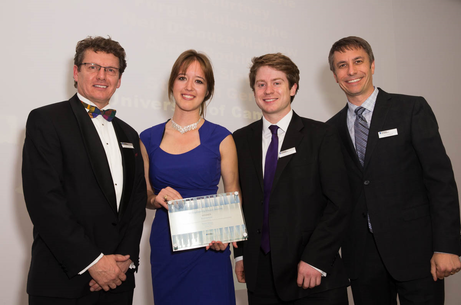
A Gates Cambridge Scholar has been awarded a prestigious national engineering impact award for her work on a device which aims to deliver life-saving medications and nutrients to breastfeeding infants.
A Gates Cambridge Scholar has been awarded a prestigious national engineering impact award for her work on a device which aims to deliver life-saving medications and nutrients to breastfeeding infants.
Rebekah Scheuerle [2013], the newly elected President of the Gates Cambridge Scholars Council, has won a National Instruments (NI) Engineering Impact Award in the Biomedical category for her use of LabVIEW and NI DAQ hardware to verify devices that prevent HIV transmission between mother and child during breastfeeding.
She says: “According to the World Health Organisation, the global infant mortality rate is 4.6 million per year, a figure which could be reduced with increased access for infants to appropriate methods of administering existing medications. This award recognises our technical development here in the Department of Chemical Engineering and Biotechnology of engineering systems for validating a novel device we are developing for delivering life-saving medications and nutrients to breastfeeding infants.
“Our device, the Nipple Shield Delivery System, when worn by a mother during breastfeeding, releases medications directly into milk consumed by an infant. This device could be disposable and contain therapeutics that do not require refrigeration, making it a hygienic method of infant drug delivery that could be especially useful in resource-limited settings.”
With support from National Instruments hardware and software, the team has built breastfeeding simulation apparatuses which they use to test drug delivery out of the device under physiologically relevant conditions. As part of their research, they have collaborated with JustMilk, a non-profit organisation supporting the project; the University College London School of Pharmacy, who supports formulation development of potential medications to deliver with the device; and the University of Venda, which supports their ongoing end-user acceptability studies in Limpopo, South Africa.
The work has been enabled by financial support from the United States Agency for International Development (USAID), the Government of Norway, the Bill & Melinda Gates Foundation, Grand Challenges Canada and the UK Government.












